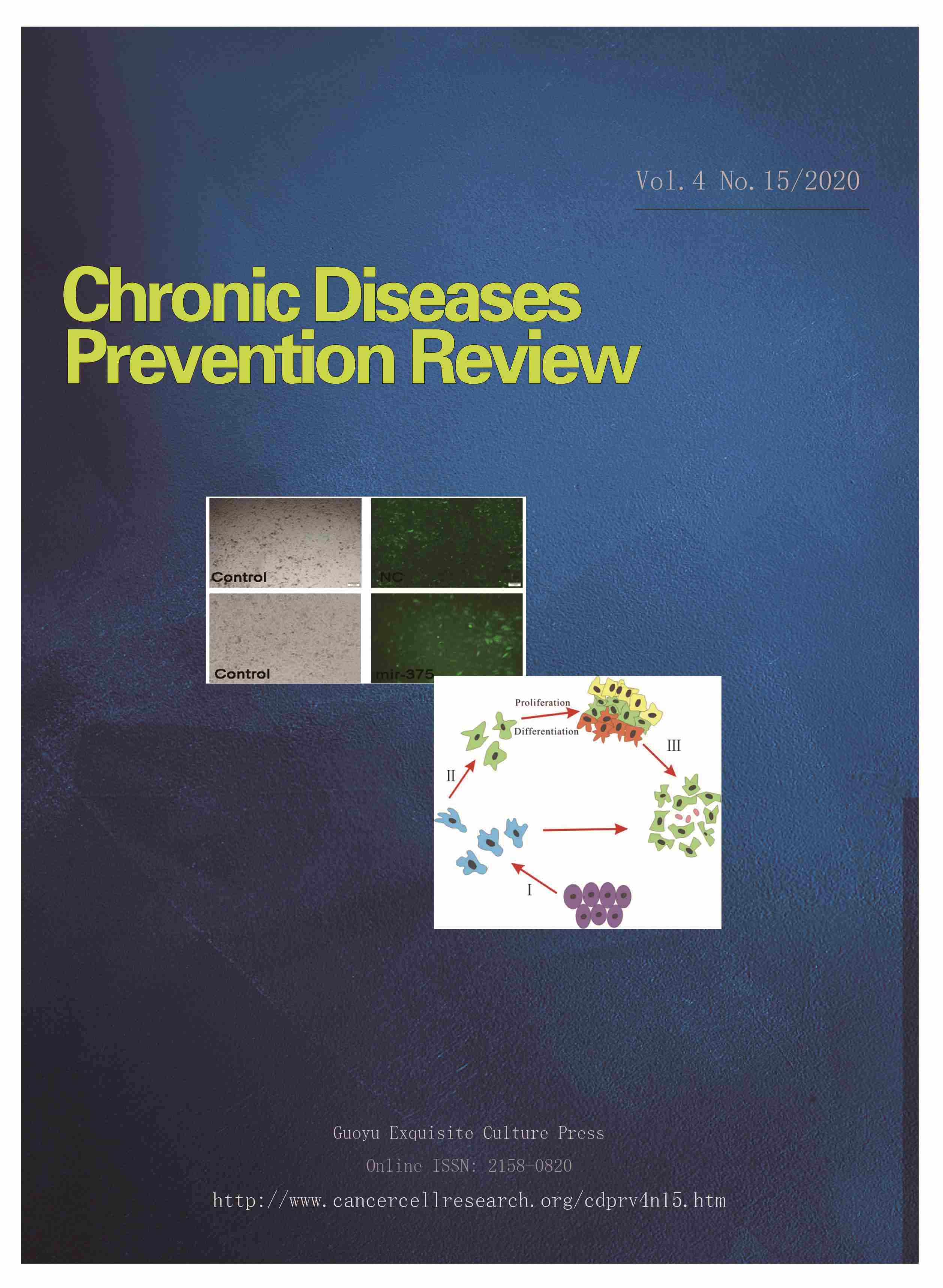Chronic Diseases Prevention Review (Online ISSN: 2158-0820)
Current Issue
Vol.4 No.15
Article: Research progress of CRISPR-Cas system application
by Miaoyu Liu
Chronic Diseases Prevention Review 2020 4(15) 1-4; published online 5 July 2020
Abstract:
The CRISPR-Cas system is an adaptive immune defense system
found in the genomes of 45% bacteria and most archaea in
recent years, which can effectively resist the invasion of
foreign genetic elements. In recent years, the CRISPR-Cas
system has been used in many fields, such as gene editing,
gene therapy, bacterial typing and evolution research.
Open Access Download (free) PDF
Article: The effects of high-intensity interval training in prevention and treatment of depression and anxiety: a systematic review and meta-analysis
by Chenggang Wu, Feng Gao, Song Yuan, Luoyi Shi, Peng Wang, Fei Liu
Chronic Diseases Prevention Review 2020 4(15)5-20; published online 15 July 2020
Abstract:
To assess the effects of high-intensity interval training
(HIIT) in reducing or preventing depression or anxiety. A
systematic electronic searching of the PubMed, EMBASE,
Cochrane Central Register of Controlled Trials (CENTRAL),
Web of Science, SPORTSDiscus, PsycINFO, SCOPUS and CINAHL
(EBSCOhost) was initially performed up to 5 December 2019.
Randomized controlled trials (RCTs) were included if they
contained data on depression and/or anxiety outcomes taken
pre and post HIIT treatment. Data were extracted by 2
independent coders. Estimates were examined by using
random-effects meta-analysis Fourteen independent samples
(493 participants) were included. There was a statistical
significant reduction in depression symptom following HIIT
compared with both continuous training (CT) and control
conditions (CON) (HIIT vs. CT: standardized mean difference
[SMD]=-0.35, 95% confidence Interval [CI] -0.66 to -0.04,
P=0.025; CON: SMD=−0.49, 95% CI −0.92 to −0.07, P=0.022).
There were no statistically significant differences between
groups in anxiety symptom (HIIT vs. CT: SMD=-0.45, 95% CI
-1.11 to 0.21, P=0.182; CON: SMD=-0.14, 95% CI -0.47 to
0.18, P=0.386). HIIT is associated with decreased concurrent
depressive symptoms; the association with anxiety symptoms
is weak.
Open Access Download (free) PDF
Article: The application effect of cognitive impairment training in patients with Alzheimer's disease in the early and middle stage
by Caihong Xue, Furong Sun, Fangyuan Wang, Mingming Hu
Chronic Diseases Prevention Review 2020 4(15)21-24; published online 15 August 2020
Abstract:
To explore the application effect of cognitive impairment
functional training in patients with early and mid-term
Alzheimer's disease and the influence of different training
cycles on the application effect. 52 patients with
Alzheimer's disease were selected for 4, 8, 12 and 16 weeks
of cognitive impairment training (2 training sessions per
week for 30-45 min) in the early and middle stages.
Self-control was used at the end of each cycle. Simple
Mental State Scale (Mini-Mental State Examination, MMSE).
Montreal Cognitive Assessment Scale (Montreal cognitive
assessment, MoCA). The Lawton and Brody Instrumental
Activities of Daily Living (Instrumental Activities of Daily
Living, IADL). The cognitive ability and daily living
ability of the patients were evaluated, and the evaluation
results of each cycle were compared with those when they
were enrolled. There were significant differences between
MMSE, MOCA and ADL scores and group entry score (P<0.05).
Differences in scores between groups were statistically
significant (P<0.05). Cognitive impairment training is
effective in delaying the progress of Alzheimer's disease in
the early and middle stages, and the effect of different
training cycles was significantly different, which also
plays an important role in improving the quality of life of
patients.
Open Access Download (free) PDF
Article: Relationship between caffeine and alcohol intake and osteoporosis
by Genquan Jin, Jingjing Wang, Xiubo Jiang
Chronic Diseases Prevention Review 2020 4(15)25-31; published online 15 August 2020
Abstract:
Osteoporosis is a common bone metabolic disorder that can
make people weak. It is characterized by reduced bone
density and mass, and is often associated with damaged
trabecular bone structures, leading to an increased risk of
fracture. The pathogenesis of osteoporosis is complex, and
the influencing factors include genetic factors,
environmental factors, dietary conditions, poor living
habits, etc. Moreover, the risk of osteoporosis also varies
among different ages, genders and races. At present, there
are few studies on the relationship between caffeine and
alcohol intake and osteoporosis at home and abroad, and the
conclusions of relevant studies are still controversial.
Therefore, this study intends to use the large data set of
the National Health and Nutrition Examination Survey to
investigate the relationship between caffeine and alcohol
intake and osteoporosis, and the results of this study can
provide scientific basis for the prevention of osteoporosis
in adults.
Open Access Download (free) PDF

